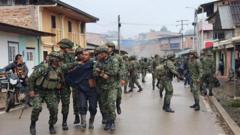The Colombian army has successfully freed 57 soldiers who had been held captive by locals in the mountainous Cauca region for several days, according to the country's defense minister, Pedro Sánchez. This operation, called "Operation Justice," unfolded without any reports of gunfire, illustrating a strategic approach to a potentially volatile situation.
The minister indicated that the hostage-taking was orchestrated by the EMC rebel group, known for its overshadowing presence in cocaine production and trafficking within the region. He described the actions of the locals who seized the soldiers as directives from the insurgents. The crisis began when military personnel attempted to airlift a suspected EMC member on Saturday; however, they soon found themselves encircled by locals numbering over 100.
The following day saw a subsequent military unit taken captive by an even larger gathering of civilians, as noted by General Erick Rodríguez of the Colombian army. Although similar incidents have occurred in the past, the scale of this particular hostage situation was exceptional.
Typically, locals engage in negotiations through humanitarian channels, resulting in the swift release of hostages. This time, however, those detaining the soldiers rejected any mediators, prompting the military to mobilize additional forces to the region. In total, the operation led to the arrest of 20 individuals linked to the kidnapping attempt.
The military estimates that over 90% of local residents depend on coca cultivation for their livelihoods, making the military presence a perceived threat. The Cauca region has long been plagued by various armed groups which exploit farmers and landowners, engaging in illegal mining alongside cocaine trafficking, deepening the area's political and socio-economic complexities.



















